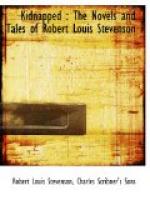“It’s loaded,” said a voice.
“I have come here with a letter,” I said, “to Mr. Ebenezer Balfour of Shaws. Is he here?”
“From whom is it?” asked the man with the blunderbuss.
“That is neither here nor there,” said I, for I was growing very wroth.
“Well,” was the reply, “ye can put it down upon the doorstep, and be off with ye.”
“I will do no such thing,” I cried. “I will deliver it into Mr. Balfour’s hands, as it was meant I should. It is a letter of introduction.”
“A what?” cried the voice, sharply.
I repeated what I had said.
“Who are ye, yourself?” was the next question, after a considerable pause.
“I am not ashamed of my name,” said I. “They call me David Balfour.”
At that, I made sure the man started, for I heard the blunderbuss rattle on the window-sill; and it was after quite a long pause, and with a curious change of voice, that the next question followed:
“Is your father dead?”
I was so much surprised at this, that I could find no voice to answer, but stood staring.
“Ay” the man resumed, “he’ll be dead, no doubt; and that’ll be what brings ye chapping to my door.” Another pause, and then defiantly, “Well, man,” he said, “I’ll let ye in;” and he disappeared from the window.
CHAPTER III
I MAKE ACQUAINTANCE OF MY UNCLE
Presently there came a great rattling of chains and bolts, and the door was cautiously opened and shut to again behind me as soon as I had passed.
“Go into the kitchen and touch naething,” said the voice; and while the person of the house set himself to replacing the defences of the door, I groped my way forward and entered the kitchen.
The fire had burned up fairly bright, and showed me the barest room I think I ever put my eyes on. Half-a-dozen dishes stood upon the shelves; the table was laid for supper with a bowl of porridge, a horn spoon, and a cup of small beer. Besides what I have named, there was not another thing in that great, stone-vaulted, empty chamber but lockfast chests arranged along the wall and a corner cupboard with a padlock.
As soon as the last chain was up, the man rejoined me. He was a mean, stooping, narrow-shouldered, clay-faced creature; and his age might have been anything between fifty and seventy. His nightcap was of flannel, and so was the nightgown that he wore, instead of coat and waistcoat, over his ragged shirt. He was long unshaved; but what most distressed and even daunted me, he would neither take his eyes away from me nor look me fairly in the face. What he was, whether by trade or birth, was more than I could fathom; but he seemed most like an old, unprofitable serving-man, who should have been left in charge of that big house upon board wages.
“Are ye sharp-set?” he asked, glancing at about the level of my knee. “Ye can eat that drop parritch?”




